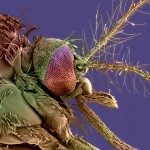Lien vers Pubmed [PMID] – 32858762
Lien DOI – 10.1002/vms3.342
Vet Med Sci 2020 Aug; ():
Recent expansion of arboviruses such as West Nile (WNV), Usutu (USUV), and tick-borne encephalitis (TBEV) over their natural range of distribution needs strengthening their surveillance. As common viral vertebrate hosts, birds and horses deserve special attention with routine serological surveillance. Here, we estimated the seroprevalence of WNV, USUV and TBEV in 160 migrating/resident birds and 60 horses sampled in Mazandaran, Golestan, North Khorasan, Kordestan provinces and Golestan province of Iran respectively. ELISA results showed that of 220 collected samples, 32 samples (14.54%), including 22 birds and 10 horses, were positive. Microsphere immunoassay results showed that 16.7% (10/60) of horse blood samples collected in Golestan province were seropositive against WNV (7; 11.7%), Flavivirus (2; 3.3%) and seropositive for USUV or WNV (1; 1.7%). Furthermore, micro virus neutralization tests revealed that four of seven ELISA-positive bird blood samples were seropositive against WNV: two Egyptian vultures, and one long-legged buzzard collected in Golestan province as well as a golden eagle collected in North Khorasan province. No evidence of seropositivity with TBEV was observed in collected samples. We showed that WNV, responsible for neuroinvasive infection in vertebrates, is circulating among birds and horses in Iran, recommending a sustained surveillance of viral infections in animals, and anticipating future infections in humans.

